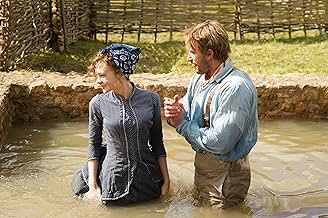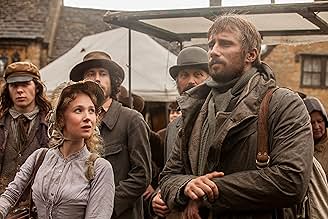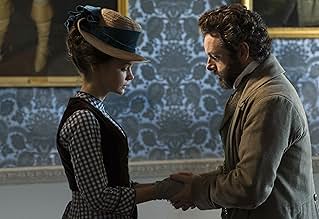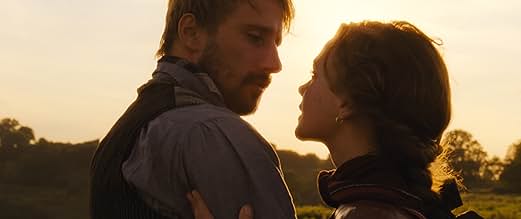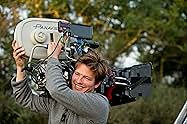In Victorian England, the independent and headstrong Bathsheba Everdene attracts three very different suitors: Gabriel Oak, a sheep farmer; Frank Troy, a reckless Sergeant; and William Boldw... Read allIn Victorian England, the independent and headstrong Bathsheba Everdene attracts three very different suitors: Gabriel Oak, a sheep farmer; Frank Troy, a reckless Sergeant; and William Boldwood, a prosperous and mature bachelor.In Victorian England, the independent and headstrong Bathsheba Everdene attracts three very different suitors: Gabriel Oak, a sheep farmer; Frank Troy, a reckless Sergeant; and William Boldwood, a prosperous and mature bachelor.
- Director
- Writers
- Stars
- Awards
- 2 wins & 11 nominations total
- Director
- Writers
- All cast & crew
- Production, box office & more at IMDbPro
Featured reviews
I think the scene when Fanny got the wrong church was disappointing as well. There was no sense of the mad dash she had across town to find the right church and only to find Frank striding out full of indignation at being stood up and telling her "It's too late!" The beautiful words of Gabriel to Bathsheba "when I look up there ye will be and when you look up there I will be" just don't feature at all.
The "shooting at the end was tame to say the least & Martin Sheen was much less forceful in his insistence of marrying Bathsheba But I did like Carey Mulligan as Bathdheba. What was missing was the energy & drama the original film had and dare I say it some Wessex accents....
Thomas Hardy would make a fortune today writing soap opera period pieces like Far from the Madding Crowd for HBO. That's a compliment because this film is done with such restraint (far fewer gratuitous country-beautiful shots and more close ups) that it could have been set in any era and the human condition would be the same.
Besides its fidelity to the spirit of Hardy's typically bright, tough farm girl ("I have an education. Nothing else"), class division, complicated loves, Far offers a heroine, Bathsheba (well-cast, crooked smiling Mulligan) far ahead of her time (See the above quote). Although she doesn't want for suitors, she doesn't want to be subjugated by a husband either ("being some man's property"). Katherine Hepburn could have played this role.
As life and Hardy would have it, chance and human nature have their own agendas, and Bathsheba makes bad decisions based on youthful passion and naiveté—Hardy, frequently a figurative scold, makes sure she pays amply for her mistakes before he sets the balance right between fortune and misfortune. His more famous Tess of the d'Urbervilles is the finest example of the strong-willed, suffering heroine, who, because of weak men, is mercilessly buffeted by the fates and her own weakness.
One of Bathsheba's suitors, the painfully shy William Boldwood (Michael Sheen), personifies the aging Victorian society, bound in property and loneliness; to her he importunes, "I want very much to protect you for the rest of your life." However, the temporary prize of Bathsheba is given to the crimson-uniformed rake, Sergeant Francis Troy (Tom Sturridge), another character waiting for Hardy's punishment.
The obvious right guy for her is farmer Gabriel Oak (Matthias Schoenaerts), whose steadfast love for the heroine could only be compared to Job's suffering. To her he always speaks honestly and lovingly: "I'm not going to tell stories just to please you. You can be sure of that."
Far from the Madding Crowd is a crowd pleaser. Hardy would have loved the adaptation.
It may not please everyone but I think the director has managed to create a strong love story that allows the central character to develop throughout the two hour run. Mulligan captures every aspect of the character well and despite her making lots of bad choices we still stick by her.
Michael Sheen does well in his role and there are plenty of twists that kept me on the edge of my seat.
In this age of franchises and big blockbuster superhero nonsense it is refreshing that this film manages to tell a good story with a wonderful cast and hopefully will be enjoyed by many.
Carey Mulligan plays Ms. Everdene, and she is exceedingly independent and ambitious for the time period, while simultaneously being attractive in a more timeless manner. This rare combination results in three quite different suitors. She first meets sheep farmer Gabriel Oak (Matthias Schoenaerts, Rust and Bone), who is smitten with her spunk, and he proposes by offering her way out of poverty. She declines and the next time they cross paths, the tables have turned as she has inherited a farm and he has lost everything due to an untrained sheep dog. Next up is a proposal from a socially awkward, but highly successful neighborhood farmer. Michael Sheen plays William Boldwood, who is clueless in his courting skills, but understands that combining their farms would be a make-sense partnership. The third gent is Sergeant Francis Troy (Tom Sturridge), a master of seduction by sword. She is sucked in by Troy's element of danger, unaware of his recent wedding gone awry to local gal Fanny Robbin (Juno Temple).
As with most literary classics and in fact, most books the screen adaptation loses the detail and character development that make the book version so enjoyable. Still, we understand the essence of the main characters, and the actors each bring their own flavor to these roles. The story has always been first and foremost a study in persistence, and now director Vinterberg and Mulligan explore the modern day challenges faced by women in selecting a mate: slow and steady, financially set, or exciting and on edge. In simpler language, should she follow her head, wallet or heart?
Vinterberg has set himself a difficult task. Schlesinger's film was a landmark of British cinema, marking the beginning of what I have come to think of the "heritage cinema" style of film-making. In my eyes at least, and I suspect in the eyes of many others, it has become the definitive version; I cannot re-read the novel- it is a favourite of mine and I have read it several times- without picturing Bathsheba as Julie Christie, Gabriel as Alan Bates, Troy as Terence Stamp or Boldwood as Peter Finch.
Like Schlesinger, Vinterberg sticks fairly closely to Hardy's story, although of necessity some minor episodes have had to be omitted. There were one or two touches I didn't really care for, such as the scene where Troy grabs Bathsheba by the crotch. In the novel Hardy describes Troy's seduction of the young woman with great delicacy. This is not just a question of Victorian prudery, but also of psychological realism. A girl as independent and determined as Bathsheba would have resented such a crude approach; had Troy attempted it he would doubtless have got his face slapped for his pains. I also felt that this version rather inflated the social status of both Bathsheba and Boldwood. In the novel both are prosperous farmers, but nothing more. Here they live in the sort of style which would suggest she is the Lady of the Manor and he a wealthy aristocrat.
Hardy's novel is, among other things, a celebration of the English countryside, and this aspect is brought out well here. Like Schlesinger's, the film is visually attractive with some striking photography of the rural landscapes, often seen bathed in a soft, golden glow. On the acting side I was most impressed by Matthias Schoenaerts as Gabriel. His interpretation is rather different from Bates's, making his character perhaps more genteel and less rough-hewn, but still a man of great sensitivity and integrity. The Belgian-born Schoenaerts speaks flawless English with no hint of a foreign inflection, although it is noticeable that, unlike Bates, he does not attempt a West Country accent. Possibly wisely- English regional accents can be notoriously difficult for foreign-born actors.
On the other hand, I was less impressed by Tom Sturridge who makes an unmemorable Troy, lacking the roguishness and devil-may-care charm which Stamp brought to the role. Michael Sheen is better as Boldwood, but never quite matches Finch's desperate, nervous intensity. The difference, perhaps, is that Sheen's Boldwood is obsessed by Bathsheba whereas Finch's is almost literally possessed by her. Carey Mulligan has plenty of experience in films of this type, having inherited the crown formerly worn by Helena Bonham-Carter and Keira Knightley, that of Reigning Queen of Period Drama. She has been praised for her performance here, but personally I preferred Christie's rather more imperious and headstrong interpretation. Vinterberg's film is a generally solid, well- made piece of period drama, but for me it will not replace Schlesinger's as the definitive version. 7/10
Did you know
- TriviaAsked who she would have chosen if she had these three very different suitors in real life, Carey Mulligan chuckled as she quickly replied, "I probably would have gone for the guy with the baby lamb (Gabriel) in the first 20 minutes of the film."
- GoofsIn the final scene when Gabriel leaves the farm he is wearing white trousers and white shirt with a dark waistcoat but shortly later when B catches up with him he is dressed in completely different clothes.
- Quotes
Bathsheba Everdene: It is difficult for a woman to define her feelings in a language chiefly made by men to express theirs.
Details
- Release date
- Countries of origin
- Official site
- Language
- Also known as
- Lejos del mundanal ruido
- Filming locations
- Mapperton, Beaminster, Dorset, England, UK(Bathsheba Everdene's farm)
- Production companies
- See more company credits at IMDbPro
Box office
- Budget
- £12,000,000 (estimated)
- Gross US & Canada
- $12,236,500
- Opening weekend US & Canada
- $164,985
- May 3, 2015
- Gross worldwide
- $30,599,369
- Runtime
- 1h 59m(119 min)
- Color
- Sound mix
- Aspect ratio
- 2.35 : 1







